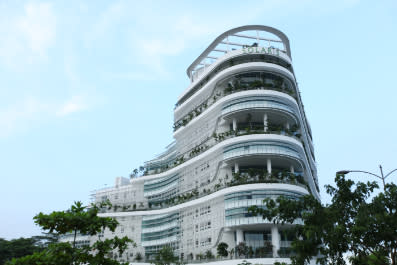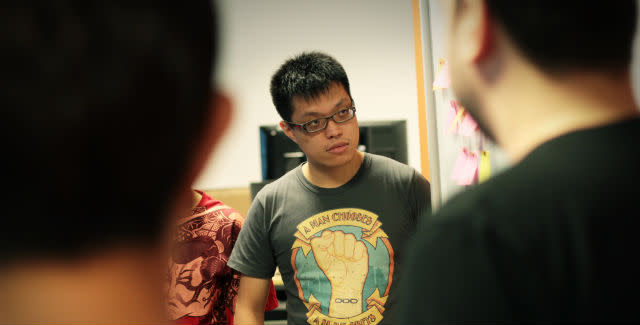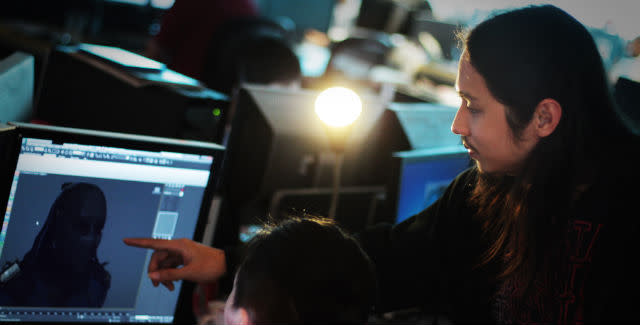What goes on behind closed doors at Ubisoft Singapore?
Game development studios are usually secretive, and for good reason. No one wants their upcoming games and new tech leaked to competitors, and certainly not to the cut throat, trigger-happy press (oops :x). But that also leads to speculation by the curious public. Ubisoft Singapore has 32 nationalities and 300 people on its staff. Just exactly what goes on behind those doors? Having been allowed in twice, I’m here to put your speculation to rest.
Day to day at Ubisoft Singapore
Solaris, the building the studio sits in.
A typical day for Ubisoft employees begins at around 9:30am. They usually hunker down for about eight hours of work a day, with more hours expected to be put in when it’s closer to crunch time. However, staff are compensated for any overtime they put in.
Team meetings – known within the company as scrums – are a big part of each day. Felix Marlo Flor is Art Director of Ubisoft’s first and only MMO, the third-person shooter Ghost Recon Online. He meets up with his team daily for updates on what they are doing before doing his rounds with individuals. Apart from that, he also has to check on the visuals used for Facebook.
Gameplay programmer Benjamin Chua in a work meeting – or scrum.
Play tests for the game begin around 4pm. The team will log into a local server and play graybox maps to check them. Graybox maps are maps with no art in them, and are used to test how each level plays. After they test out the new features, there’s a feedback session.
It’s a little different for programmers. Senior gameplay programmer Fairuz Lokman from the Assassin’s Creed team shared how a new mechanic is implemented in the game. The animators and concept artists first conceptualize the mechanic, then show the programming and design team reference videos. Together with the game designers, Lokman and his fellow programmers create for the rest of the team a functional prototype that demonstrates the mechanic. A feedback session follows, then the team continues iterating on the mechanic until it’s polished.
Staff needing a break can head over to Ubisoft Singapore’s pantry area (pictured above), which contains not just snacks and beverages, but also a pool table, a ping pong table, and includes a video game corner with a Wii U, PlayStation 3, Xbox 360, and now PlayStation 4 and Xbox One.
The business of being a game developer
“Now game development is more of an experience than just making games,” Flor said to us. And he’s right. Ubisoft Singapore has employees hailing from different backgrounds. Some come with skills in marketing and business. One even came in from the Singapore Air Force. But Ubisoft understands – and celebrates – Flor’s sentiment.
Art Director Felix Marlo Flor at work.
Employees at Ubisoft Singapore don’t stay in the same discipline their entire careers. They have a choice between management and expertise tracks, or they can move laterally into different areas of their existing discipline. For instance, a senior gameplay programmer like Lokman would be able to specialize in networking, physics, or AI if he chose to stay in his current discipline.
“Our managers will always see if they can support what we want to pursue,” Flor said, but added that staff are also evaluated based on their existing skillset and experience. An employee might want to expand beyond his existing discipline, but also might not be fit for what he aspires to.
More interestingly, there is no fixed number of years a member of the staff has to spend in his existing role. There’s no specific timeline with regards to promotion – if you fit the role, and it clicks, then it’s yours.
Of course, all this is moot if you don’t actually get to work at Ubisoft Singapore. Aspiring employees typically go through a minimum of two rounds of interviews, and are also required to undergo aptitude tests. However, the most important deciding factor when it comes to new hires is teamwork.
Click here to view the embedded video.
(The video dates back from 2011, but the staff still do nerf gun battles in the office.)
With thirty two nationalities under its roof, Ubisoft Singapore is a multicultural hotpot, and staff there have to work with people hailing from all sorts of diverse cultures. People skills are important.
When given the choice of a misanthropic genius with a brilliant portfolio versus a charismatic team player with a small, ordinary portfolio, Alex Lim, talent acquisition manager at Ubisoft Singapore, opted for the rare combination of both values: “We would like to have someone with a brilliant portfolio who is also a charismatic team player,” he said via email.
How the Singapore studio fits in with the rest of the Ubisoft world
Ubisoft Singapore has done two great things for video games. One, it conceived, developed and produced the epic naval battles in Assassin’s Creed III. Two, Ubisoft Singapore is the birthplace of Ghost Recon Online, the French company’s first foray into free-to-play MMO games.
The naval battles were “the best example Ubisoft Singapore has to show [they] can innovate within existing brands,” said Fairuz Lokman, a senior gameplay programmer who worked on Assassin’s Creed III. Once they learned that the game was based around the American Revolution, the team in Singapore thought that they could develop the gameplay around naval battles, which were a focus of the revolution.
Click here to view the embedded video.
For those of you who missed the Assassin’s Creed III gameplay reveal at E3, whether in person or via the live stream, you really missed out. Fairuz said that the team “wasn’t sure” what the response would be like. But judging from the way the crowd responded when the naval battles played out, their worries were unfounded. And ultimately, that mechanic took on an even more central role in the recently-released sequel Assassin’s Creed IV: Black Flag.
Click here to view the embedded video.
Ghost Recon Online is another Ubisoft IP created entirely in Singapore. The massively multiplayer online third-person shooter is part of the late Tom Clancy’s Ghost Recon series and is free to play, supported by microtransactions. Ghost Recon Online is also the first free-to-play triple-A game from Ubisoft.
“It was a big thing, starting from scratch and seeing it go all the way,” said Felix Marlo Flor, Art Director of Ghost Recon Online, adding that the game now has about three million beta testers. “It’s quite fulfilling to see it from start to finish.”
Click here to view the embedded video.
There you go, that’s about all the public knowledge I was able to glean from my time there. If working in Ubisoft Singapore has piqued your interest, or if it’s something that you already plan to aim for, stay tuned for our next article: tips for working at Ubisoft Singapore.
(Photos: Ubisoft Singapore. Special thanks to Sylviane from Ubisoft for setting this opportunity up for us.)
The post What goes on behind closed doors at Ubisoft Singapore? appeared first on Games in Asia.
The post What goes on behind closed doors at Ubisoft Singapore? appeared first on Games in Asia.







